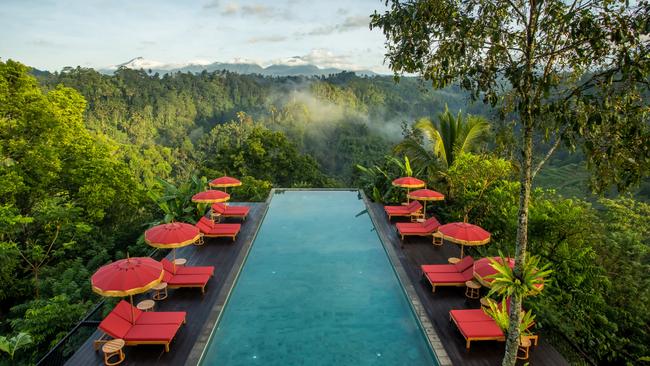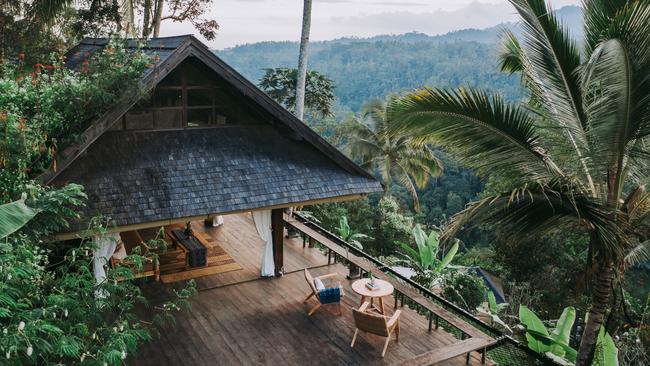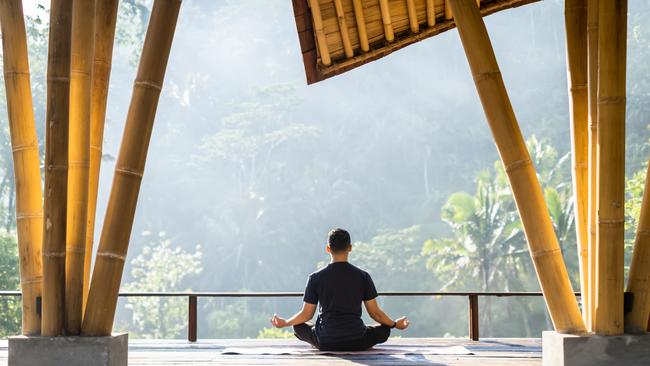Returning to Bali: what to know before you go
The holiday island has undergone a string of changes over the last two years — and very good deals abound to kickstart the tourism industry. But there are some new requirements, too.

While we’ve been away, Bali has seen a ripple of accommodation developments and refurbishments, which has provided ongoing jobs for local construction and hospitality workers. Beach and community clean-ups have been initiated, and behind the scenes at many resorts staff has been retrained in supplementary roles. Surprisingly, perhaps, brand-new resorts have opened, or are about to launch, as the “Bali is back” news gets out. Unsurprisingly, very good deals abound to kickstart the tourism industry.
The preferred new locales for smaller and more authentic developments are Payangan near Ubud, Lovina on the northwest coast, and Amed on the northeast coast, where the two-bedroom retreat Ashling Villa Amed is a good example of an under-the-radar hideaway option in a quiet beachside locale. In the mainstream mix, some of the top-tier resorts are offering money-saving lures, such as at the Capella Ubud tented encampment, where guests are offered three nights for the price of two, a spa treatment and free PCR test.
Discounted flights are selling fast and the buzz is building. Bali has long been a favourite of Australian holidaymakers and its dependence on tourism has been a double-edged sword. Before Covid hit in early 2020, popular tourist hubs were beset with traffic snarls, garbage and ocean pollution was becoming an issue and rampant overdevelopment threatened to deface the prettiest beach locales. How many more high-rise hotels, cafes, restaurants, homewares shops, bars and nightclubs did the destination really need?
According to the island’s tourism authority, 6.3 million visitors arrived in 2019. The travel and hospitality industry has since crashed with hundreds of thousands of jobs lost and livelihoods put in peril. Many hospitality workers were forced to return from tourist enclaves to their families in villages where subsistence agriculture is the traditional form of work. A recent report in The Conversation cited that “the government may finally be persuaded to act on strong advice from the Bank of Indonesia to reduce the dependence on tourism by developing ‘other sectors such as agriculture, creative [and] digital economy and education’. Such solutions may appear obvious, but are easier said than done.”
Those who view the two-year pandemic pause as a necessary and inevitable reset of over-tourism must also consider the human cost of a situation created by relatively wealthy visitors, tour operators with a maximum-group approach and a business model that favours only mainstream suppliers, and (often) greedy investors. There’s no easy answer, other than to hope that the reopening will see a more sensitive awakening, a new respect for the destination and a reboot to the communities that favours the local economy.
A Pollyanna prediction? Probably, but let’s be part of the bounce back, treading lightly, tipping generously when appropriate, asking hotels and local operators about ways we can support local charities or shelters, and proceeding with a heightened sense of awareness.
Be prepared
Get in the mood with a new cookbook, Paon: Real Balinese Cooking (Hardie Grant, $50), by Tjok Maya Kerthyasa and I Wyan Kresna Yasa. The title means “kitchen” and the authors, who present more than 80 recipes, hope readers will be “encouraged to make their own coconut milk and spice pastes, double-cook rice the traditional way, and use their hands and intuition”. Or just take the easy route and get stuck in at Salt & Palm Restaurant in Sydney‘s inner-west Glebe where owner and head chef Natasya Soetantyo expertly dishes up the flavours of her former homeland, layered with house-made stocks and sauces. Buy a jar of Natasya’s irresistibly spicy sambal to go.
Up, up and away
Check airline deals with Qantas, Jetstar and Virgin; expect specials to sell very quickly. Seats for school holiday periods are pretty well all booked for 2022 but Virgin is showing ample availability from most of its Australian ports in November and deals on premium fares. Sale prices usually allow for a 12-month window of travel. Qantas Holidays has a portfolio of accommodation packages, including a price-leader at four-star Bali Garden Beach Resort for five nights, with return flights to Denpasar, from $1090 a person, depending on dates and Australian departure port. National airline Garuda recommenced its Australia-Bali services on March 4.
Jungle hideout

Buahan, a Banyan Tree Escape There are 16 villas with semi-open floor plans in various configurations and private pools at this new resort oasis in a relatively untouched jungle setting, 40 minutes by road north of Ubud. The Banyan Tree philosophy is all about next-to-nature seclusion and privacy and this is the template at its very best. Opening offers, from mid-June, include daily breakfasts and dinners, one-hour spa treatment, snacks and soft drinks. From IDR10,945,868, ($1019), minimum two-night stay. Also check Buahan area deals, extras and other touring options available from The Bali Bible, which is offering an eight-night package that includes selected hotel and resort accommodation, daily breakfasts, transport, sunrise climb up a volcano, cycling trip, waterfall walk and other soft adventure options; $1290 a person.
Luxe plus
Anantara Ubud Bali Resort The accommodation brand’s third Bali property opens mid-year with 85 guestrooms, an inventory of lavish pool villas with one or two bedrooms and 15 residences available for sale and lettings. In the hillside village of Payangan amid terraced rice fields, its location is not far from Buahan, perhaps heralding a regeneration of this uplands area for high-end tourism. Introductory rates soon to be offered. Meantime, sister property Anantara Uluwatu has a Back to Bali three-night package with airport pickup, daily breakfasts, one dinner, Balinese-style massage and PCR test; from $US745 plus taxes, valid to December 20.
Red-hot specials
Le Chien Rouge This modest and quiet option near Lovina Beach, famous for its dolphin-watching cruises aboard outrigger boats, opened about 18 months ago and is excellent value. There are sufficient Balinese touches in the design and fit-out to set it apart from its competitors. The nine tile-floored guestrooms with chic ensuites are airconditioned and well-furnished, arrayed by an excellent pool (rimmed with lounge beds covered in bright red fabric) in frangipani-filled gardens. It sits well in the so-called backpacker-luxe (or flashpacker) accommodation bracket. There’s French-Indonesian management, breakfast on site and an airport shuttle service at reasonable cost. From about $58, room only, depending on dates, via a range of booking platforms.
Airbnb has just released a list of its top 10 Bali “wishlist” properties according to search statistics with overnight tariffs from a modest $50 to about $1000 across cottages. tree houses and beach pads. Check the stylish one-bedroom Villa Atlantis near Seminyak, from $110 a night depending on season.

Fresh beach beauty
Renaissance Bali Nusa Dua Resort Opened in late 2021, this five-star Marriott Bonvoy member is a more family focused mainstream choice and features 310 guestrooms and suites, four pools, six dining and bar options, plus architecture and interior design elements that mimic the island’s cultural heritage, including arts, craft and dance. It sits high over the Nusa Dua coastline with hillside and ocean views. From about IDR1,650,000 a night for two; room only. The It’s Time for Bali package, from IDR2,079,000 and valid to December 31, includes buffet breakfasts for two and a daily credit of IDR200,000 to spend onsite.
In the know
Indonesian entry requirements are subject to frequent change. Broadly, visitors 12 years and over must be fully vaccinated (the second dose administered more than 14 days before arrival) and provide evidence of a COVID-19 (PCR) test taken within 48 hours of departure. Visas of 30-day validity (about $47), which can be extended once only for a maximum of an additional 30 days, are issued at Denpasar airport; there’s no formal quarantine but visitors must have travel insurance with Covid coverage and should download the Peduli Lindungi (Care Protect) app for check-ins and contact tracing. Monitor DFAT and airline updates on immigration formalities.


To join the conversation, please log in. Don't have an account? Register
Join the conversation, you are commenting as Logout